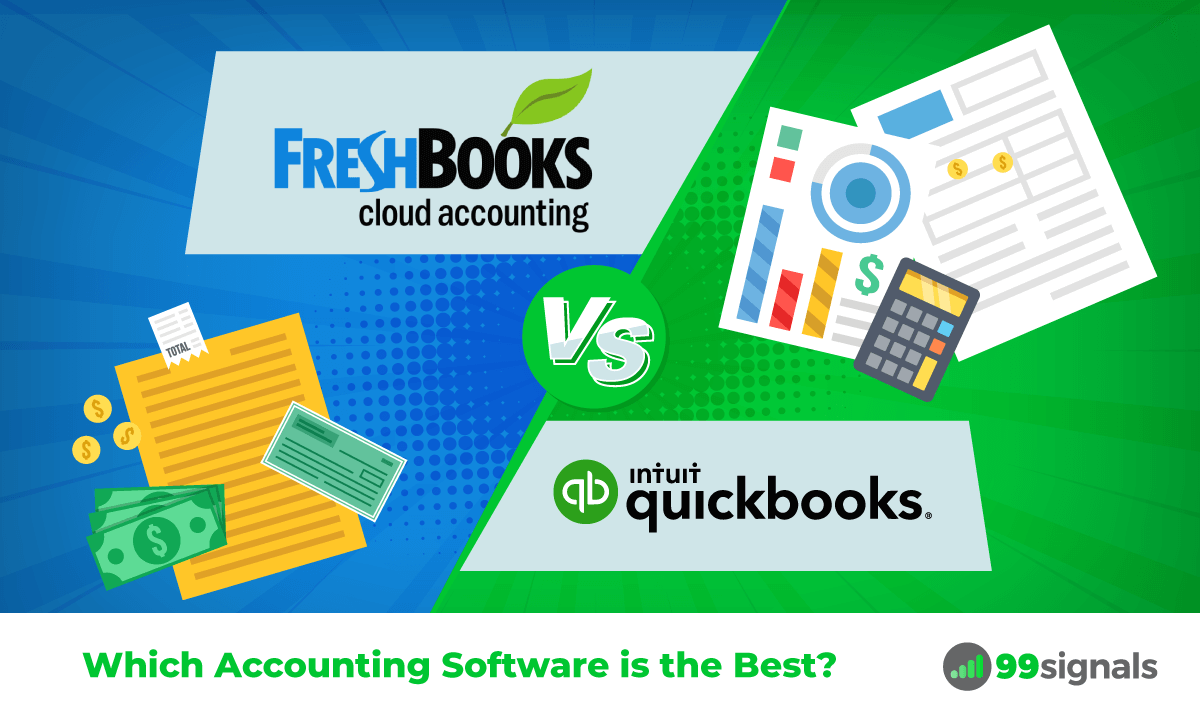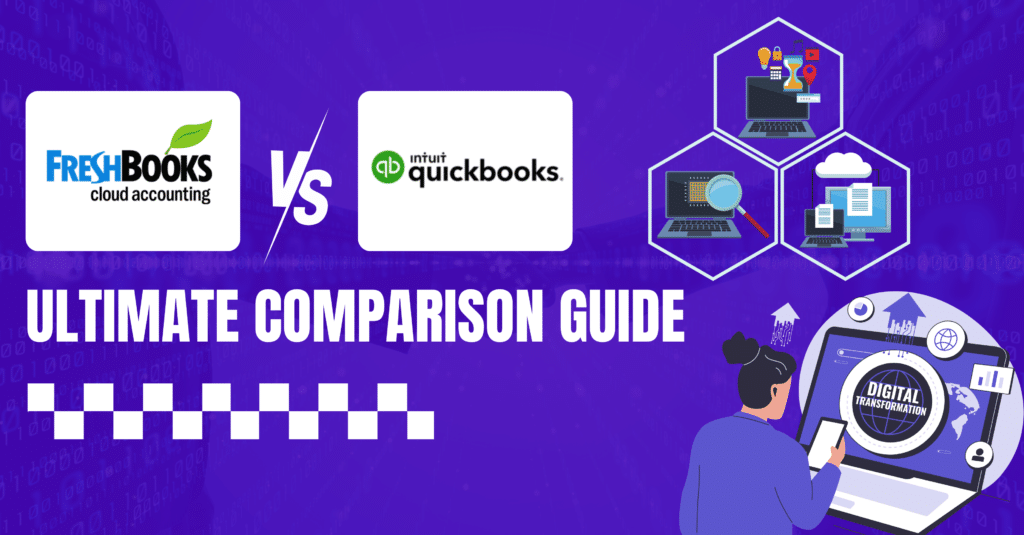Choosing the right accounting software can be challenging. FreshBooks and QuickBooks Online are two popular options.
Each has unique features that cater to different business needs. Comparing FreshBooks and QuickBooks Online helps businesses find the best fit. Both platforms offer robust tools for managing finances, but they serve different purposes. FreshBooks is known for its user-friendly interface and strong invoicing capabilities.
QuickBooks Online, on the other hand, excels in comprehensive accounting features and integrations. Understanding the strengths and weaknesses of each can save time, money, and stress. This blog post will guide you through the key differences, helping you make an informed decision for your business. Whether you are a freelancer, small business owner, or larger enterprise, this comparison will offer valuable insights.

Credit: www.99signals.com
Overview Of Freshbooks
When choosing accounting software, understanding the features and pricing is key. Let’s explore the overview of Freshbooks to help you make an informed decision.
Key Features
Freshbooks offers a range of features designed to simplify accounting for small businesses and freelancers. Some of the standout features include:
- Invoicing: Create professional invoices in seconds.
- Expense Tracking: Easily track expenses and categorize them.
- Time Tracking: Log hours worked and bill clients accurately.
- Project Management: Collaborate with team members and clients on projects.
- Reporting: Generate detailed reports on income, expenses, and more.
- Mobile App: Access your accounting data on the go.
Pricing Plans
Freshbooks offers various pricing plans to suit different business needs. Here is a quick look at their pricing structure:
| Plan | Monthly Cost | Features |
|---|---|---|
| Lite | $15 |
|
| Plus | $25 |
|
| Premium | $50 |
|
Freshbooks also offers a custom pricing plan for enterprises with more advanced needs. This plan includes personalized support and tailored features.

Credit: blog.megaventory.com
Overview Of Quickbooks Online
QuickBooks Online is a popular accounting software designed for small to medium-sized businesses. It offers various tools to manage finances, track expenses, and generate reports. QuickBooks Online aims to simplify accounting tasks, allowing business owners to focus on growth.
Key Features
QuickBooks Online includes numerous features to streamline financial management. Some of its key features are:
- Invoicing: Create and send professional invoices easily.
- Expense Tracking: Track expenses by linking bank accounts and credit cards.
- Financial Reporting: Generate detailed financial reports with a few clicks.
- Payroll Management: Manage payroll and employee benefits seamlessly.
- Inventory Tracking: Track inventory levels and manage stock efficiently.
- Tax Preparation: Simplify tax filing with integrated tax tools.
- Mobile App: Access your financial data on the go with the mobile app.
Pricing Plans
QuickBooks Online offers several pricing plans to suit different business needs. Each plan provides a range of features to cater to various requirements.
| Plan | Monthly Cost | Features |
|---|---|---|
| Simple Start | $25 |
|
| Essentials | $50 |
|
| Plus | $80 |
|
| Advanced | $180 |
|
User Interface And Experience
Choosing between Freshbooks and Quickbooks Online can be challenging. Both offer robust features. But user interface and experience play a crucial role. Let’s dive into the details under two subheadings: Ease of Use and Navigation.
Ease Of Use
Freshbooks prides itself on its easy-to-use interface. Designed for freelancers and small businesses, it offers a clean and simple layout. New users can navigate quickly without a steep learning curve. Features like invoice creation and expense tracking are intuitive.
Quickbooks Online, on the other hand, is slightly more complex. It caters to both small and larger businesses. The interface is packed with features, making it powerful but less straightforward. Users might need some training to master it. Yet, it offers comprehensive tools for detailed accounting.
Navigation
In Freshbooks, navigation is smooth. The dashboard presents all key features at a glance. Users can access invoices, expenses, and reports with just a few clicks. The menu is straightforward, making it easy to find what you need.
Quickbooks Online has a more extensive menu. This can be overwhelming for new users. But it offers customizable options. Users can rearrange the dashboard to suit their preferences. The search function is powerful, helping users find specific tools or reports quickly.
Here’s a quick comparison in table format:
| Feature | Freshbooks | Quickbooks Online |
|---|---|---|
| Ease of Use | Simple, beginner-friendly | Complex, needs training |
| Navigation | Smooth, intuitive | Extensive, customizable |
Both Freshbooks and Quickbooks Online offer unique strengths. Your choice depends on your business needs.
Accounting Features
Both FreshBooks and QuickBooks Online offer robust accounting features that cater to small businesses. This section delves into their capabilities in invoicing and expense tracking. Understanding these features helps you decide which software best meets your needs.
Invoicing
FreshBooks provides an easy-to-use invoicing tool. You can create professional invoices in minutes. FreshBooks allows customization, so your invoices match your brand. Automate payment reminders and late fees to save time.
QuickBooks Online also excels in invoicing. It offers customizable templates and recurring invoices. QuickBooks Online integrates well with various payment gateways. This makes it easier to get paid faster.
| Feature | FreshBooks | QuickBooks Online |
|---|---|---|
| Customization | Yes | Yes |
| Automated Reminders | Yes | Yes |
| Payment Integration | Limited | Extensive |
Expense Tracking
FreshBooks offers simple expense tracking. Capture receipts, categorize expenses, and link bank accounts. You can even track expenses on the go with their mobile app.
QuickBooks Online provides a comprehensive solution for expense tracking. Sync your bank accounts, categorize expenses, and attach receipts. The software also offers detailed financial reports.
- FreshBooks: Easy capture and categorization
- QuickBooks Online: Detailed reporting and bank sync
Both FreshBooks and QuickBooks Online offer essential accounting features. Your choice depends on your business needs.
Integration Options
When choosing accounting software, integration options are crucial. Both FreshBooks and QuickBooks Online offer extensive integration capabilities. This section explores how each platform connects with third-party apps and payment gateways.
Third-party Apps
FreshBooks and QuickBooks Online both support a variety of third-party apps. These integrations enhance the software’s functionality and streamline your workflow.
- FreshBooks: FreshBooks integrates with over 100 apps. These include popular tools like Slack, Trello, and G Suite. This allows you to manage your business seamlessly.
- QuickBooks Online: QuickBooks Online offers more than 650 integrations. These include Salesforce, HubSpot, and Mailchimp. This extensive list ensures you can connect to your favorite tools.
| Software | Number of Integrations | Popular Integrations |
|---|---|---|
| FreshBooks | 100+ | Slack, Trello, G Suite |
| QuickBooks Online | 650+ | Salesforce, HubSpot, Mailchimp |
Payment Gateways
Both FreshBooks and QuickBooks Online support multiple payment gateways. This flexibility ensures you can receive payments quickly and securely.
- FreshBooks: FreshBooks integrates with Stripe, PayPal, and WePay. These gateways make it easy to accept online payments from clients.
- QuickBooks Online: QuickBooks Online supports PayPal, Square, and Stripe. This allows businesses to process payments efficiently.
| Software | Payment Gateways |
|---|---|
| FreshBooks | Stripe, PayPal, WePay |
| QuickBooks Online | PayPal, Square, Stripe |
Customer Support
Choosing the right accounting software often depends on the quality of customer support. FreshBooks and QuickBooks Online both offer various support options. Comparing their customer support can help you make a better choice.
Support Channels
Both FreshBooks and QuickBooks Online provide multiple support channels. FreshBooks offers:
- Email support
- Phone support
- Live chat
- Knowledge base
QuickBooks Online also offers diverse support options, including:
- Email support
- Phone support
- Live chat
- Community forums
- Online tutorials
Response Time
Response time is crucial in customer support. FreshBooks typically responds to email inquiries within 24 hours. Their phone support is available during business hours. Live chat offers quick responses, usually within minutes.
QuickBooks Online has a similar response time. They aim to respond to emails within 24 hours. Phone support is available during business hours. Live chat is also responsive, with wait times often less than five minutes.
Here’s a quick comparison:
| Support Channels | FreshBooks | QuickBooks Online |
|---|---|---|
| Email Support | Available | Available |
| Phone Support | Available | Available |
| Live Chat | Available | Available |
| Community Forums | Not Available | Available |
| Online Tutorials | Not Available | Available |
Pros And Cons
Choosing the right accounting software can be challenging. FreshBooks and QuickBooks Online are popular choices. Each has its own strengths and weaknesses. Below, we compare their pros and cons to help you decide which is best for your business.
Freshbooks Pros And Cons
FreshBooks is known for its ease of use and intuitive design. It is ideal for small businesses and freelancers.
| Pros | Cons |
|---|---|
|
|
Quickbooks Online Pros And Cons
QuickBooks Online offers more comprehensive accounting features. It is suitable for small to medium-sized businesses.
| Pros | Cons |
|---|---|
|
|

Credit: www.reconcile.ly
Final Verdict
Choosing between FreshBooks and QuickBooks Online can be tough. Both platforms offer unique benefits for different users. This section will help you decide which one suits your needs best.
Best For Small Businesses
QuickBooks Online often tops the list for small businesses. Its comprehensive features and robust tools make it ideal for managing complex financial tasks. Small business owners benefit from:
- Advanced reporting capabilities
- Inventory management
- Multiple user access
QuickBooks Online also integrates well with other business tools. This integration streamlines operations and improves efficiency. With a strong customer support system, small businesses can get help when they need it.
Best For Freelancers
FreshBooks is a top choice for freelancers. Its user-friendly interface and simple invoicing tools make it easy for freelancers to manage their finances. FreshBooks offers:
- Easy-to-use invoicing
- Time tracking
- Expense management
Freelancers can also benefit from FreshBooks’ strong mobile app. This allows them to manage their finances on the go. FreshBooks also provides excellent customer support, ensuring freelancers get assistance quickly.
| Feature | QuickBooks Online | FreshBooks |
|---|---|---|
| Reporting | Advanced | Basic |
| Invoicing | Comprehensive | Simple |
| Inventory Management | Yes | No |
| Ease of Use | Moderate | High |
Both FreshBooks and QuickBooks Online have their strengths. Small businesses may prefer the advanced features of QuickBooks Online. Freelancers might find FreshBooks easier to use. Consider your specific needs before making a decision.
Frequently Asked Questions
What Are The Main Differences Between Freshbooks And Quickbooks Online?
Freshbooks is known for its simplicity and user-friendly interface. Quickbooks Online offers advanced accounting features. Freshbooks is ideal for small businesses. Quickbooks Online suits medium to large enterprises. Both offer invoicing and expense tracking.
Which Is Better For Small Businesses: Freshbooks Or Quickbooks Online?
Freshbooks is better for small businesses. It is user-friendly and simple. Quickbooks Online is more complex. It offers advanced features for larger businesses. Freshbooks focuses on invoicing and expenses.
How Does Pricing Compare Between Freshbooks And Quickbooks Online?
Freshbooks pricing starts at $15 per month. Quickbooks Online starts at $25 per month. Freshbooks offers fewer features. Quickbooks Online provides more comprehensive accounting tools. Both offer various plans based on needs.
Can Freshbooks And Quickbooks Online Integrate With Other Apps?
Yes, both Freshbooks and Quickbooks Online integrate with other apps. Freshbooks integrates with tools like Slack and Trello. Quickbooks Online integrates with Shopify, PayPal, and more. These integrations enhance functionality and efficiency.
Conclusion
Choosing between FreshBooks and QuickBooks Online depends on your business needs. FreshBooks offers simplicity and ease of use. It’s great for freelancers and small businesses. QuickBooks Online provides more advanced features and integrations. Ideal for larger businesses with complex needs.
Both tools have their strengths. Consider your specific requirements before deciding. Evaluate your budget, features, and scalability. Try free trials to see which fits best. Both can streamline your accounting tasks effectively.


